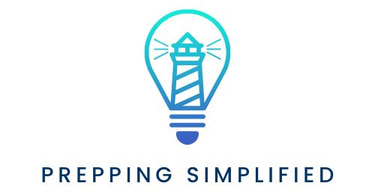7 must read books about prepping and disaster preparedness
Discover the best prepping and survival books to build your disaster preparedness skills fast. Start reading today and be ready for any emergency.
EMERGENCY PREPAREDNESS
10/20/20254 min read


Being prepared is more than just having the right gear. It’s about knowing exactly what to do when disaster strikes and having the confidence to act fast. Reading the best prepping and survival books helps you gain real skills and make smart decisions when every second counts. These expert-approved disaster preparedness books give you clear advice, proven strategies, and practical steps to protect yourself and your family. No matter your experience level, the right knowledge can save lives. Start reading now and get ready before the next emergency hits.
1. Prepper's Long-Term Survival Guide by Jim Cobb
This bestselling guide with over 8,200 reviews and a 4.5-star rating on Amazon is a must-read for anyone new to prepping. Written by expert Jim Cobb, it offers clear and simple advice on how to prepare for long-term emergencies. You'll learn how to store food and water, build a bug-out bag, protect your home, and take care of your family during a crisis. It also covers important skills like first aid, water purification, and using backup power in a way that’s easy to understand. It’s a great all-in-one resource for beginners who want to feel more confident and self-sufficient.
2. When All Hell Breaks Loose: Stuff You Need to Survive When Disaster Strikes by Cody Lundin
This popular book, rated 4.6 stars with over 1,300 reviews on Amazon, is a fun and practical guide to surviving disasters at home. Written by survival instructor Cody Lundin, it combines useful advice with humor and illustrations to make learning easy and enjoyable. You'll learn how to handle real-life emergencies using things you already have around the house. The book covers topics like staying clean, cooking without power, dealing with trash, and creating shelter during a crisis. It also helps you understand how to stay calm and think clearly when everything feels out of control. With a positive and realistic approach, this book is perfect for beginners who want to be ready without the fear.
🛒Grab your copy on Amazon and learn how to survive with confidence.
3. SAS Survival Handbook (Third Edition) by John ‘Lofty’ Wiseman
This survival classic, with a 4.8-star rating and over 7,700 reviews on Amazon, is one of the most trusted guides in the world. Written by a former British Special Air Service instructor, it teaches you how to survive in any environment: desert, jungle, sea, or city. The book covers everything from finding water, building shelter, and tying knots to treating injuries, signaling for help, and navigating without GPS. While it’s a big guide, it’s organized and filled with helpful illustrations, making it easy to use as a go-to reference whenever you want to learn a new skill. This updated edition also includes the latest tips on emergency medicine. If you want one book that covers everything from wilderness survival to urban prepping, this is the one to get.
🛒Order it now on Amazon and start building real survival skills.
4. The Prepper’s Survival Bible: Your Complete Guide to Surviving Any Crises & Disasters by Morgan J. Kepler
Rated 4.8 stars by over 1,200 readers on Amazon, this all-in-one survival guide is perfect for beginners who want a complete prepping resource. Written by experienced survivalist Morgan J. Kepler, it combines 10 prepping topics in one easy-to-follow book. You’ll learn about bugging in vs. bugging out, food and water storage, off-grid power, homesteading basics, bushcraft, urban survival, and more. Each section comes with simple step-by-step guides and checklists, so you can jump straight to what you need—whether it’s stocking supplies, growing your own food, or handling first aid. With a mix of time-tested advice and modern techniques, this book is a go-to for anyone starting their prepping journey.
🛒Get your copy on Amazon and start preparing with confidence today.
5. Just in Case: How to Be Self-Sufficient When the Unexpected Happens by Kathy Harrison
This beginner-friendly favorite, rated 4.6 stars with over 400 reviews on Amazon, is a great introduction to prepping. Written by Kathy Harrison—a mom and longtime prepper—this book feels like getting honest advice from a friend. It covers all the basics, like making a family emergency plan, building emergency kits, storing food and water, and handling power outages. What makes it special is how simple and relatable it is. With real-life stories and clear step-by-step tips, it’s especially helpful for families and anyone just starting out. If you're new to prepping and want a calm, easy guide to walk you through everything, this is a perfect place to begin.
🛒Grab your copy on Amazon and start preparing with confidence.
6. How to Survive the End of the World as We Know It by James Wesley Rawles
This practical guide, rated 4.5 stars on Amazon, is perfect for anyone serious about long-term survival. Written by James Wesley Rawles, a former U.S. Army Intelligence officer and founder of SurvivalBlog.com, the book offers straightforward advice on preparing for major disasters like economic collapse, pandemics, or power grid failures. You'll learn how to store food and water, secure your home, grow a garden, and protect your finances. It also covers essential skills like filtering rainwater, choosing the right seeds, and setting up reliable communication. With clear checklists and step-by-step instructions, it's an excellent resource for beginners and experienced preppers alike.
7. The Disaster Preparedness Handbook: A Guide for Families by Arthur T. Bradley
This well-rounded guide, rated 4.4 stars on Amazon, is a great choice for anyone who wants to be ready for all kinds of emergencies. Written by Dr. Arthur T. Bradley, a NASA engineer and Army veteran, the book covers everything from natural disasters like floods and hurricanes to bigger threats like economic collapse and even nuclear events. It’s written in a clear and simple way, with step-by-step checklists to help you get prepared. It also includes tips for families with kids, seniors, pets, or people with disabilities. If you're looking for one book that covers it all and is easy to follow, this is a solid choice.
🛒Order it on Amazon and start getting your family ready today.
Getting started with prepping can feel overwhelming, but it doesn't have to be. These beginner-friendly books make it easy to learn what to do, step by step. You’ll find practical tips on building your pantry, learning survival skills, and getting prepared for anything. Each book is full of useful advice that’s simple and easy to follow.
Start reading today and take control of your safety. Knowledge is power. Get prepared, stay ready, and feel confident about the future.
Ready to take the next step? Check out our guide to the best pre-made disaster preparedness kits and find the one that’s right for you!
Disclaimer:
This site contains affiliate links to Amazon. As an Amazon Associate, I may earn a commission from qualifying purchases. Your support helps keep the site running, with no extra charge to you.
The information provided on this website is for general informational purposes only. While we strive to ensure accuracy and reliability, the content is not intended as professional advice. Always consult with qualified professionals for specific needs or situations.
